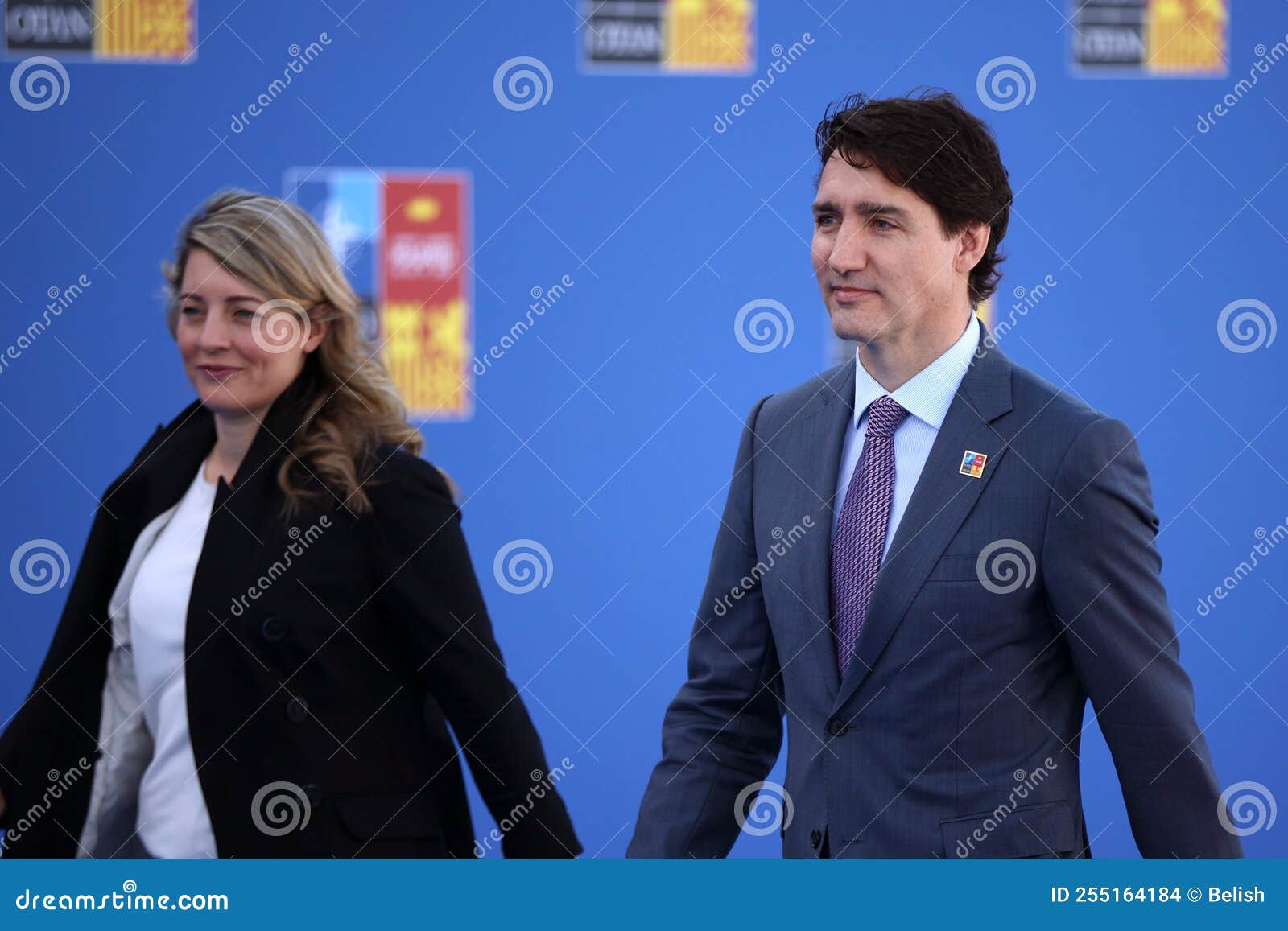Mélanie Joly and Justin Trudeau have emerged as two of Canada's most influential political figures, shaping the nation’s policies and global image in remarkable ways. From their early days in public service to their current roles, both leaders have demonstrated a commitment to progressive governance and inclusivity. Mélanie Joly, a key member of Trudeau's cabinet, has consistently championed causes like cultural diversity and digital innovation, while Justin Trudeau has led the country with a vision of equality and environmental sustainability. Their collaborative efforts have not only strengthened Canada's domestic policies but have also positioned the nation as a global leader in addressing critical issues such as climate change and social justice.
As Canada continues to navigate complex challenges, the partnership between Mélanie Joly and Justin Trudeau has become a cornerstone of the Liberal Party's success. Their shared values and complementary strengths have allowed them to tackle pressing issues head-on, from fostering economic growth to advancing reconciliation with Indigenous communities. Whether it’s through Joly’s focus on cultural diplomacy or Trudeau’s emphasis on international cooperation, the duo has demonstrated a unique ability to unite Canadians and promote a forward-thinking agenda.
While their political careers have been marked by both achievements and controversies, there is no denying the significant impact they have had on Canada’s political landscape. In this article, we will delve into their biographies, explore their contributions to Canadian society, and examine the challenges they have faced along the way. By understanding their journeys and leadership styles, readers can gain a deeper appreciation for how Mélanie Joly and Justin Trudeau continue to shape the future of Canada.
Read also:Discovering Diana Rider The Ultimate Guide To Her Life Achievements And Influence
Table of Contents
- Biography of Mélanie Joly
- Biography of Justin Trudeau
- How Have Mélanie Joly and Justin Trudeau Influenced Canadian Politics?
- What Are the Key Policies Advocated by Mélanie Joly?
- How Has Justin Trudeau Shaped Canada’s Global Image?
- What Challenges Have Mélanie Joly and Justin Trudeau Faced?
- The Future of Canadian Politics with Mélanie Joly and Justin Trudeau
- FAQs About Mélanie Joly and Justin Trudeau
Biography of Mélanie Joly
Mélanie Joly was born on March 27, 1979, in Montreal, Quebec. She grew up in a bilingual household, which laid the foundation for her fluency in both French and English—a skill that would later serve her well in her political career. Joly pursued her education at the Université de Montréal, where she earned a law degree, and later completed a master’s degree in public administration at Harvard University. Her academic background equipped her with a deep understanding of governance and policy-making, which she has applied throughout her career.
Before entering politics, Joly worked as a lawyer and founded an organization called "Gros Plan," aimed at encouraging youth participation in public life. Her passion for public service led her to join the Liberal Party of Canada, where she quickly rose through the ranks. In 2015, she was elected as the Member of Parliament for Ahuntsic-Cartierville, a position she has held ever since. Over the years, Joly has served in various ministerial roles, including Minister of Canadian Heritage and Minister of Foreign Affairs, where she has championed causes such as cultural preservation and international diplomacy.
Below is a table summarizing Mélanie Joly's personal details and bio data:
| Full Name | Mélanie Joly |
|---|---|
| Date of Birth | March 27, 1979 |
| Place of Birth | Montreal, Quebec, Canada |
| Education | Université de Montréal (Law), Harvard University (Public Administration) |
| Political Party | Liberal Party of Canada |
| Current Role | Minister of Foreign Affairs |
Biography of Justin Trudeau
Justin Trudeau, the eldest son of former Prime Minister Pierre Elliott Trudeau, was born on December 25, 1971, in Ottawa, Ontario. Growing up in a political family, Trudeau was exposed to the intricacies of governance from a young age. After completing his education at McGill University and the University of British Columbia, he embarked on a career as a teacher and later became involved in community activism. His charisma and leadership skills soon caught the attention of the Liberal Party, leading to his election as the Member of Parliament for Papineau in 2008.
Trudeau’s political ascent reached new heights in 2013 when he was elected as the leader of the Liberal Party. Under his leadership, the party experienced a resurgence, culminating in a decisive victory in the 2015 federal election. As Canada’s 23rd Prime Minister, Trudeau has focused on progressive policies such as gender equality, climate action, and Indigenous reconciliation. Despite facing criticism and challenges, his ability to connect with Canadians has solidified his position as a transformative leader.
How Have Mélanie Joly and Justin Trudeau Influenced Canadian Politics?
Mélanie Joly and Justin Trudeau have played pivotal roles in shaping Canadian politics through their innovative approaches and commitment to social progress. Joly’s tenure as Minister of Canadian Heritage has been marked by her efforts to promote multiculturalism and preserve Canada’s rich cultural heritage. She has also been instrumental in advancing digital policies that support the creative industries, ensuring that Canada remains competitive in the global economy.
Read also:John Cena Age A Comprehensive Look At The Wwe Superstars Life And Career
Meanwhile, Trudeau’s leadership has been defined by his emphasis on inclusivity and environmental sustainability. His government has introduced landmark policies such as the Canada Child Benefit and the Carbon Pricing Plan, both of which have had a significant impact on Canadian society. By prioritizing issues like gender equality and reconciliation with Indigenous peoples, Trudeau has sought to build a more equitable and just nation.
Key Achievements of Mélanie Joly
- Advocacy for cultural diversity and bilingualism.
- Implementation of the Creative Canada Policy Framework.
- Leadership in international diplomacy as Minister of Foreign Affairs.
Key Achievements of Justin Trudeau
- Introduction of the Canada Child Benefit.
- Commitment to achieving net-zero emissions by 2050.
- Advancement of reconciliation efforts with Indigenous communities.
What Are the Key Policies Advocated by Mélanie Joly?
Mélanie Joly has consistently championed policies that reflect her dedication to cultural preservation, digital innovation, and international cooperation. One of her most notable initiatives is the Creative Canada Policy Framework, which aims to support Canada’s creative industries by fostering innovation and expanding global markets. This policy has been praised for its focus on ensuring that Canadian artists and creators can thrive in an increasingly digital world.
In addition to her work in cultural policy, Joly has been a strong advocate for bilingualism and multiculturalism. As Minister of Canadian Heritage, she has implemented programs to promote linguistic duality and celebrate Canada’s diverse cultural heritage. Her efforts have helped reinforce the importance of inclusivity in Canadian society.
Why Is Cultural Preservation Important to Mélanie Joly?
Cultural preservation is central to Joly’s vision for Canada because it ensures that the nation’s unique identity is protected and celebrated. By investing in the arts and cultural industries, she believes that Canada can maintain its global influence while fostering a sense of national pride.
How Has Justin Trudeau Shaped Canada’s Global Image?
Under Justin Trudeau’s leadership, Canada has emerged as a global leader in addressing pressing issues such as climate change, gender equality, and human rights. His government’s commitment to the Paris Agreement and the introduction of a national carbon pricing plan have positioned Canada as a champion of environmental sustainability. Additionally, Trudeau’s advocacy for gender equality has been evident in policies like the Gender Equality Advisory Council, which advises the G7 on advancing women’s rights.
Trudeau’s diplomatic efforts have also strengthened Canada’s relationships with other nations. His emphasis on multilateralism and cooperation has earned him respect on the international stage, even as he navigates complex geopolitical challenges.
What Role Does Multilateralism Play in Trudeau’s Foreign Policy?
Multilateralism is a cornerstone of Trudeau’s foreign policy, as he believes that collaboration is essential for addressing global challenges. By working with international organizations and allies, Canada has been able to advocate for peace, security, and sustainable development worldwide.
What Challenges Have Mélanie Joly and Justin Trudeau Faced?
Despite their successes, Mélanie Joly and Justin Trudeau have faced numerous challenges throughout their political careers. For Joly, one of the primary obstacles has been balancing the demands of cultural preservation with the need for economic growth. Critics have argued that some of her policies favor urban centers over rural communities, highlighting the ongoing tension between tradition and modernization.
Trudeau, on the other hand, has faced criticism for his handling of issues such as the SNC-Lavalin scandal and the Wet’suwet’en pipeline protests. These controversies have tested his leadership and raised questions about accountability within his government. Nevertheless, both leaders have demonstrated resilience and a willingness to adapt in the face of adversity.
How Have Critics Responded to Trudeau’s Leadership Style?
While Trudeau is admired for his progressive vision, critics have accused him of being overly idealistic and out of touch with certain segments of the population. Despite these criticisms, his ability to inspire hope and optimism has remained a defining feature of his leadership.
The Future of Canadian Politics with Mélanie Joly and Justin Trudeau
As Canada looks to the future, the contributions of Mélanie Joly and Justin Trudeau will undoubtedly continue to shape the nation’s trajectory. With ongoing challenges such as climate change, economic inequality, and reconciliation with Indigenous communities, their leadership will be crucial in navigating these complex issues. By staying true to their values and embracing innovative solutions, Joly and Trudeau have the potential to leave a lasting legacy that benefits all Canadians.
FAQs About Mélanie Joly and Justin Trudeau
What Are Mélanie Joly’s Main Priorities as Minister of Foreign Affairs?
As Minister of Foreign Affairs, Mélanie Joly prioritizes strengthening Canada’s international relationships, promoting human rights, and addressing global challenges such as climate change and economic inequality.
How Has Justin Trudeau Addressed Climate Change in Canada?
Justin Trudeau has implemented policies such as the Carbon Pricing Plan and committed Canada to achieving net-zero emissions by 2050. His government has also invested in renewable energy and sustainable infrastructure.
What Role Does Multiculturalism Play in Mélanie Joly’s Policies?
Multiculturalism is a cornerstone of Mélanie Joly’s policies, as she believes that celebrating Canada’s diversity is essential for fostering inclusivity and national unity.
In conclusion, Mélanie Joly and Justin Trudeau have made significant contributions to Canadian politics, leaving an indelible mark on the nation’s domestic and international policies. Their shared commitment to progress and inclusivity ensures that they will remain influential figures in shaping Canada’s future. For more information on Canadian politics, visit Canada’s official government website.


